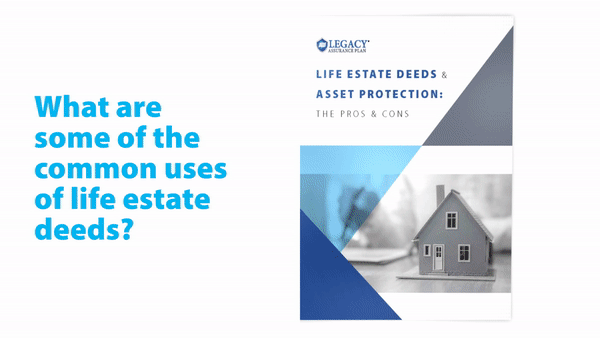A common use of the life estate deed involves eligibility for Medicaid benefits. It's important to consider the drawbacks with this strategy, including complications that can arise involving the property's remainderman.
You might have heard of the phrase "life estate." But what does it mean? The short answer is that a life estate is ownership of property for the lifetime of that person. By way of example, suppose Sally deeds her property to her son, Arthur, but retains the right to possession of the property for so long as she lives. Sally has a life estate in the property. Arthur is called a "remainderman" because he gets the property after Sally dies.
What's the point?
The life estate has its origins in centuries-old English common law. Back then, like today, women tended to live longer than men did. But women had little, if any, means of support. After their husbands died, they could be destitute. To attempt to avoid such poverty, the English came up with the principle that the woman should have the use of property after her husband died during the rest of her lifetime. Based on this foundation, we now have life estates that can be created by deed.
What's the point of the life estate today?

What with wills, trusts, life insurance and the fact that women now comprise more than half of the workforce, why do we still need life estates? There are sophisticated estate-planning techniques, beyond the scope of this article, that employ the life estate. But the most common use of the life estate today is to plan for becoming eligible for Medicaid benefits as one becomes older.
About Medicare and Medicaid
We are all familiar with Medicare and Medicaid. The similarity of the words is unfortunate because they are sometimes confused with each other. But the two programs differ substantially:
- Medicare is a national health insurance entitlement program funded by payroll deduction. People aged 65 and up are eligible to use Medicare, as well as younger people who are disabled.
- Medicaid is a state and federal program designed to help people with limited income and resources to pay medical and related costs. One of the benefits of Medicaid is that it covers long-term care, primarily for older people who are the ones most likely to need that kind of care.
The key here is that Medicaid provides long-term care for people who don't have the resources to pay for it themselves. Let's see how the life estate affects Medicaid.
Reducing resources through life estates
Medicaid is a means-tested benefit. In other words, if you have too much money or property, you are not eligible for Medicaid. At least in theory, you have enough money to pay for it yourself. But it doesn't seem fair that you should have to use up all the property you spent your lifetime acquiring just to obtain Medicaid benefits, instead of leaving that property to your children or to other family members.
To divest yourself of property, yet keep the right to use it, you can deed your property to another but retain the use of the property for your lifetime. After you pass away, the property goes to the remainderman. Remember our example above? Sally deeded her property to her son Arthur, whom she would have left it to by will anyway but kept the right to possess the property until she died. For purposes of Medicaid means-testing, Sally no longer owns the property, so its value can't be counted against her when she seeks Medicaid benefits.
The "look-back" period
There are some limitations on using a life estate to reduce property ownership to qualify for Medicaid. The primary limitation is based on when you created the life estate. The government does not want to allow a person to give away all their property one day and apply for Medicaid the next day because that would amount to an abuse of the Medicaid system. To avoid that abuse, Medicaid imposes a five-year "look-back" period between the time that you apply for Medicaid and the date you disposed of your property. Transfers of property within that five-year period are subject to penalties.
Other life estate benefits
Using a deed to create a life estate has other benefits not related to Medicaid. They include:
- The iron-clad right to possess the property by living there until you pass away. You could, of course, simply give or sell your property to the person you would name as remainderman anyway and lease it back, but leases can be broken.
- Retaining certain tax exemptions based on property ownership.
- Receiving income from renting the property should you decide not to live there but rent it out instead.
- If you decide to sell the property, and you have resided on it for least two of the past five years, you will remain eligible for the $250,000 capital gains exclusion if you sell for a profit.
Drawbacks to the life estate
There are some reasons not to use the life estate to qualify for Medicaid. Here are some of them:

- If the remainderman dies before the life tenant dies, then the remainderman's interest is part of the remainderman's estate. Depending on whether the remainderman has a will, and if so, what it says, the property could wind up being owned by someone other than you would like.
- Unlike with a will, you can't "disinherit" the remainderman without the remainderman's consent because the remainderman's interest in the property was created by deed.
- If you grant yourself a life estate, then you can't sell your property or borrow money against it unless the remainderman agrees and joins in the transaction.
- Selling the property will not entitle you to 100% of the proceeds because the remainderman owns an interest in the property, too. Typically, your share depends upon your age at the time of the sale.
- It's possible that the property could be seized to pay a debt incurred by the remainderman. A debt might result from default on a loan, from a divorce or from bankruptcy.
Give the life estate some thought
There is a tremendous benefit to using the life estate to make one eligible for Medicaid. There are non-Medicaid reasons for using a life estate, too. But there are also drawbacks that could, in your particular situation, outweigh the benefits. For these reasons, you should think carefully before deciding whether to use the life estate to enhance your eligibility for Medicaid benefits.



